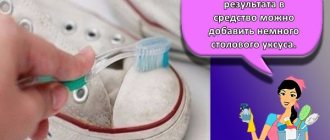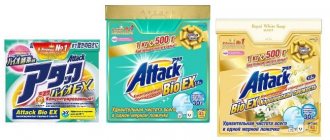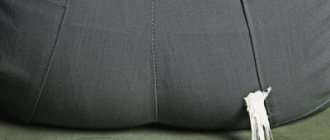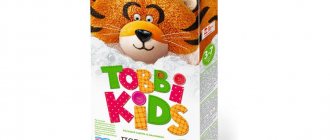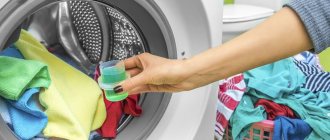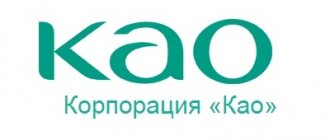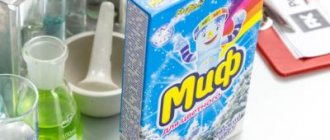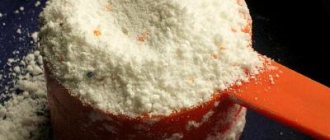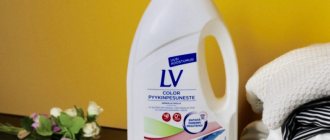What products should not be used in an automatic washing machine?
Using an automatic washing machine at home is a significant help. But its operation requires special attention. Many items or items with certain parts cannot be washed. But no less dangerous are the products used to clean clothes.
Negatively affects machine parts:
- Too much washing powder or gel. This contributes to the settling of particles and the formation of plaque on the machine parts, the appearance of a musty smell, as well as the formation of excess foam, which is difficult to rinse out of the laundry fibers.
- Inappropriate product class. That is, the use of hand washing powder, hair shampoo, technical liquids such as “Mole”. In machine mode, you should only use substances marked “for automatic washing machines.”
- Bleach or bleach. Such substances worsen the condition of the drum rubber, drain hose, and drum.
If the washing machine powder runs out, it can be replaced with other household or similar components. But in order for the washer to last longer, you must read the manufacturer’s instructions (which talk about the volume and types of detergents) and not use products that will damage its performance.
Housewives who are concerned about the health of their family may wonder what can replace washing powder when washing in order to effectively remove dust and dirt, and at the same time preserve the unit. You can replace the powder from the store with homemade, environmentally friendly one, knowing the characteristics of the components of folk remedies and the proportions.
LiveInternetLiveInternet
Quote from Velvet_Hat
Read in full To your quote book or community! How much washing powder to put in the washing machine SOURCE
Most housewives don’t even think about the fact that they use a lot of powder when washing. Most often, everything is poured “by eye”, according to the principle the more, the better. Such actions can cause not very pleasant consequences, such as: White stains on clothes after washing. Clogged washing machine container. Unpleasant smell from the drum. So how much powder should you pour into the washing machine? Let's figure it out. Instructions from the manufacturer
Instructions for washing powder
When purchasing powder, do not rely too much on the proportions indicated on the pack itself. The goal of any manufacturer is to retain the buyer and force him to use as much of the product as possible.
The amount of powder in the instructions is 3 times the amount that is actually needed for washing.
If you believe everything that is indicated on the packaging, you should spend a pack of powder weighing 450 grams for 2 washes! In fact, the norm is 1 tbsp. spoon of powder for 1 kg of dry laundry. This amount is quite enough to wash clothes and extend the life of the machine.
Markup in a container
The process of pouring powder into the container If you look at the powder container in any washing machine, you will see a small mark. This is the designation up to which you need to add detergent.
But don’t rush to be guided only by the mark. When calculating the required amount of powder, manufacturers take clothing with stubborn stains as a criterion. In addition, it is unknown what kind of powder was used in the experiments: concentrated or not.
The mark is created to ensure that you do not pour more powder than the machine needs for normal operation.
Repairman's advice
Service center employees or a household appliance repairman are best aware of the ideal proportions of laundry detergent. They all agree that 2 tbsp is enough for intensive washing. spoons of powder per 1 kg of dry laundry or 5-6 tbsp. spoons when the washing machine is fully loaded.
If you are going to wash clothes without serious stains, 1 tbsp is enough. spoons of washing powder 1 kg of clothes.
In addition to expert opinion, there are external factors that can affect the required volume of laundry detergent:
*Water quality.
*Wash type.
*Powder.
Water quality
When washing in hard water, you will use more powder than when washing in soft water. Setting the water type is very easy
You need to run an empty machine for a quick wash without powder, and during the procedure pay attention to the glass of the machine. If bubbles appear on it, the water is soft; if not, the water is hard.
For washing in soft water, just add 1 tbsp. spoon of powder, if the water is hard, use 2 tbsp. spoons.
Washing type
The volume of powder for intensive and hand washing is completely different.
If you are loading work clothes, add 1.5 tbsp per 1 kg of laundry. spoons of powder.
To remove stubborn stains, increase the dose to 2 tbsp. spoons
Powder
If you use regular washing powder (“Gala”, “Ariel”, “Tide”), the proportions remain standard - 1 tbsp for 1 kg of washing. spoon.
It's another matter when you use concentrated laundry detergents - these are well-known Amway products or Japanese powders.
For one washing session of a completely filled machine, you should use no more than 2 tbsp. spoons of concentrated powder.
If you overdo it, you will have to rewash all the laundry again - white stains will remain on the clothes. It's easy to extract the ideal amount of laundry detergent. Believe me, it is much easier to take into account all the factors and make calculations once than to wash the laundry several times or take the washing machine to a service center for repairs.
Properties of folk ingredients when washing
It's no secret that household chemicals, especially cheap or low-quality ones, contain toxic substances. They negatively affect the condition of the skin and problems with the respiratory system. You can use environmentally friendly products to add freshness to textiles and clothes for manual and automatic washing. They can be used to wash things if there is no powder without damaging the materials. For convenience, the characteristics of folk components are collected in the table.
| Peculiarity | Soap | Soda | Salt | Mustard powder | Borax | Soap root | Chestnut | Ash | Beans |
| Removes stains | + | + | + | + | + | + | + | + | + |
| Softens fabric fibers | + | + | + | + | + | + | + | + | + |
| Softens water | — | + | — | — | + | — | — | — | + |
| Eliminates odor | + | + | + | + | + | + | + | + | + |
| Whitens | + | + | — | — | + | — | — | + | — |
| Preserves fabric color | + | + | + | + | — | + | + | + | + |
| Suitable for all types of fabric | + | + | + | — | + | + | + | + | — |
| Hand wash | + | + | + | + | + | + | + | + | + |
| Machine washable | + | + | — | + | + | + | + | — | + |
| Easy to prepare | + | + | + | + | + | — | — | — | — |
Folk recipes for home remedies made from familiar and budget-friendly ingredients for cleaning and removing stains can easily replace washing powder for an automatic washing machine, as well as when washing in a basin by hand. Thanks to these substances, the laundry will become soft and fresher.
Wood ash
Our grandmothers also used this product, in the absence of soap or washing powder. In order to wash with wood ash, it was usually wrapped in burlap and placed in a basin of water. Why do you need to wait for a while? The alkali that is in the room must dissolve in water. After this has happened, you can start washing. But you need to take into account one fact: to use this method you need to take ash without any foreign impurities.
Folk remedies
Preparing homemade alternative substances will save the family budget, since the ingredients are inexpensive, will ensure the substance is environmentally friendly, and will be no less effective. Ease of use and preparation, accessibility - the advantages of solutions and mixtures of folk wisdom. Homemade mixtures will not cause allergies or other problems. The downside is that some recipes are labor-intensive to prepare.
Borax, soda and soap shavings
This combination of components helps to whiten clothes and effectively remove stains of various origins. This solution can replace washing powder at home:
- Prepare a bar of laundry soap, a glass - one and a half borax, the same volume of soda.
- Grind the soap.
- Mix the ingredients, add a couple of drops of aromatic oil.
- In dry form, homemade powder can be stored for a long time.
For use in a machine, it is poured in the same volume as a regular powder; for hand washing - 3-4 tbsp. l. The ingredients are inexpensive and the method of use is easy to follow.
Laundry soap
This is the most budget-friendly product that can replace store-bought ones. Laundry soap shavings can be placed in the washing machine compartment.
But it is not recommended to use soap often in this mode - a greasy film forms on the hoses and drum.
For hand washing, the soap is suitable for all types of fabric and can be used while soaking.
Soda Ash
The substance softens water, disinfects the drum, and deodorizes things. You can soak things in soda water.
It is enough to add 5-6 tbsp to the air conditioner compartment. l. to soften products and eliminate unpleasant odors. When soaking, add 1 tbsp to the basin. l. for 10 liters.
The use of baking soda should be avoided when caring for delicate fabrics and silk clothing.
Mustard powder
Copes well with greasy stains and is suitable for silk and woolen items.
For hand processing:
- Mustard in the amount of 4 tbsp. l. pour into 1 liter of water.
- Leave to sit for a while.
- Drain the water (leaving sediment). Just add hot water to this water and soak your clothes.
- After the procedure, rinse it thoroughly.
For an automatic machine, add 10 tbsp. l. directly into the drum, the temperature is selected no higher than 40°C so that the mustard powder does not lose its beneficial characteristics.
It is not recommended to wash cotton using this substance, as the item will shrink.
Salt
Simple and familiar salt perfectly washes linen, calico, and cotton items and preserves the richness of colors.
It is not advisable to use it in a machine so that the parts do not become clogged. When cleaning by hand, salt water is used for soaking. Proportions – 1 tsp. for 1 liter of warm water. Kitchen towels and colored items will regain their original beautiful appearance after soaking in salt water.
Soap root
The rhizomes of a plant called malnaya (or saponaria) can replace washing powder in the washing machine. To prepare a homemade solution from the rhizome you need:
- Dry and chop the roots.
- Pour 6-8 tbsp of hot water. l. crushed component, leave to soak.
- After 24 hours, heat the solution for an hour over low heat.
- Cool and strain.
- Wash or soak clothes in strained water. The root tends to foam well.
The prepared solution is not stored.
To use rhizomes in the washing machine you need:
- Dry and grind the roots of the plant.
- Sew a small cotton bag.
- Put 5-6 tbsp in a bag. l. crushed soapwort and put it in the drum.
- Wash at temperatures up to 40°C.
The amazing characteristics of the plant adequately replace store-bought powders and gels. This powder is environmentally friendly, but one of the disadvantages is the labor intensity of production.
horse chestnut
Habitual thorns can also be an alternative laundry detergent. These fruits are available, since the tree is widespread in Russia. Due to this, the product is environmentally friendly and inexpensive. Manufacturing labor costs are not high.
In order to make natural powder, you need:
- Collect the fruits, peel the prickly skin and dry.
- Chop the chestnuts.
- If you put chestnut powder into a drum, it is advisable to do this in a specially prepared bag; the temperature is set to 60°C.
- When washing by hand, put chestnut powder directly into a bowl of water.
Despite the seemingly archaic nature of this method, washing with horse chestnut is very popular in villages in the areas where it grows.
Beans
A decoction of this legume is suitable for woolen items. It whips into foam and refreshes the products.
To prepare the decoction you need:
- Boil 200 grams of beans in water until tender.
- Cool the broth and strain.
- A decoction is poured into the basin. Add hot water, beat the foam.
- Wash woolen items and rinse well.
We do not recommend this product for use in a machine to avoid the formation of deposits.
Ash
Ash lye has been used since ancient times. In modern times, you can prepare it like this:
- Pour 1 kg of ash with hot water.
- Leave to infuse for a week.
- Next, strain, dilute the grains remaining on the gauze with water.
- Textiles can be soaked or boiled in this water.
- After the procedure, rinse the product.
Ash for use in an automatic machine is not recommended to avoid clogging of parts.
Soap nuts
Exotic nuts are the fruits of the soap tree. In these areas of Asia, nuts have long been used.
They are used to clean all types of fabrics; they have no odor and lather well. Place nut shells in a bag among the laundry in a drum or basin, and use the shells several times in the wash.
The main disadvantages are inaccessibility and price.
Salt
For washing soiled cotton and linen fabrics, ordinary salt is excellent, which in most cases we use as a seasoning. The advantage of using salt is that colored fabric does not lose its bright appearance, even if you wash it several times.
To use this method, you need to take dirty things and place them in a basin. Using a measuring cup, pour warm water into the basin and note the amount of water. After this, you need to take out the things, squeeze them thoroughly and put them in another container. The remaining water will be the basis for preparing the cleaning solution. For 1 liter of water you need to add one tablespoon of salt. Then the composition must be stirred until the salt is completely dissolved. Place wet items in the prepared solution and leave them for about 2 hours. As soon as the specified time has elapsed, the items must be washed by hand in a salt mixture, squeezed out, and then rinsed thoroughly. This way you will get clean, pleasant-smelling laundry.
Household chemicals
The above folk recipes are an unusual, clean and at the same time effective replacement for industrial products. However, nowadays it is much easier to replace washing liquids and powders with other household chemicals, originally intended for other purposes. Below are the most accessible of these substitutes.
Dish detergent
A common household dish cleaner will do a good job of cleaning clothes and grease stains. It is permissible to use any dishwashing liquid, as long as the composition does not contain chlorine.
For the machine: you need to be very careful with the dosage, since dish liquids form a lot of foam. For a small amount of laundry, immediately pour 1 tsp into the drum. liquid, for medium drum loading – 2 tsp, for maximum – 3 tsp. The same amount of product will be required for hand washing.
Shampoo or liquid soap
Hair shampoo should not be used to clean clothes, as this will damage them.
Special shampoos have been developed for washing, which are used for various fabrics, including high-tech ones (membrane, sportswear fabrics). In an automatic machine, the dosage is observed according to the recommendations on the label (usually 1-2 caps); when caring for things manually, 1 cap per 10 liters is enough.
Liquid soap is gentler on hands and is a good alternative when caring for delicate fabrics. It foams well and cleans clothes and gives a pleasant smell. For machine and hand washing, soap can be used, but at a low temperature. Dosage – 1 tsp. for a small number of things, 2 tsp. – for medium, 3 tsp. - for the big one.
Perox All-Purpose Cleaner
Perox bleach is a special liquid used in laundry facilities in the food industry and healthcare. It is used for any type of fabric, water temperature range from 60°C to 90°C. Materials exposed to Perox do not deteriorate, stains of various origins are easily removed. Perox does not contain chlorine; it is an oxygen-containing bleach.
Dosage for manual cleaning: half a glass of liquid is diluted in 10 liters of hot water, the laundry is lowered and left to bleach. After the procedure, you should rinse things.
In machine mode: the same volume is added to the washing powder (gel).
Perox
A universal cleaning product that can also be used for laundry is bleach, but it does not contain chlorine. This product copes well with all types of dirt and stains, and to add fragrance to the laundry, you can drop a couple of drops of any synthetic fragrance into the drum. For one wash cycle you will need about 100-150 ml of product.
As you can see, you can often do without powder, but provided that you choose the right replacement, even if it’s temporary.
AlinaAuthor of the article
Did you like the article?
Share with your friends:
Conclusions about ways to replace washing powder
Taking care of your health is a choice for every person. Ecological homemade laundry products are useful and economical for the family budget. There are many options for replacing purchased chemicals. Soda, borax, mustard, exotic soap nuts, familiar beans and chestnuts - these are just a few of the list of products that can be washed in a machine instead of powder. Some of these remedies are still popular in villages.
If the house has run out of the usual substance for cleaning clothes, it is permissible to replace it with some types of household chemicals.
You can use food products or other household chemicals if you want to replace washing powder for an automatic machine and when washing by hand at home. The main thing to remember is that there is no need to put off washing and accumulate dirty laundry. Fresh stains are washed off easier and faster, which is especially important in the absence of specialized products.
Please rate how useful this article was to you! (No ratings yet)
Yandex recommends - the best articles on the site
You may also be interested in
- How can you replace eggs in baked goods, cutlets, cheesecakes and…
- What is better washing powder or washing gel?
- Compartments in a washing machine: which one is needed for what? Where…
- What to do if something fades during washing? How to wash...
- Instructions: how to clean a silicone baking dish from...
- How to remove yellowness from plastic at home?
- Top 15 Best Baby Powders for Newborns
- Instructions: how to bleach white linen at home?
- Instructions: how to bleach kitchen towels at home...
- Instructions: how to remove a greasy stain on a jacket?
- Top 20 products that can be used to remove fuel oil from clothes in...
- Top 20 products to clean iron from burnt soles in...
Tourmaline Spheres
A unique product for environmentally friendly and economical washing, developed by TianDe, consists of plastic spheres filled with natural components - granules of tourmaline, zeolites, rare earth metals, silver. The action of the device is based on the physical properties of the components. If in ordinary washing powder the dissolving power of water is increased due to surfactants, then in tourmaline spheres a similar effect is achieved due to weak electric currents arising when tourmaline moves in water.
Eco-friendly and completely hypoallergenic laundry detergent allows you to do without powders, bleaches and conditioner. It is enough to place the sphere in the drum of the washing machine, load the laundry and turn on the appropriate mode. When using tourmaline, neither the fibers nor the dyes of the fabric will be harmed. On the contrary, things become softer and the color of the material becomes richer due to the dissolution of the salt film on the surface of the fabric.
Only by replacing chemical powders with natural remedies will you be able to preserve your own health and the ecology of the planet.
How to do it at home?
There are several basic recipes for creating laundry detergents. By varying the components, you can obtain products whose action will be focused on:
- disinfection,
- whitening,
- stain removal.
Main components of homemade powders:
| Component | Functionality |
| Essential oil | Aromatization |
| Vinegar | Reducing water hardness |
| Hydrogen peroxide | Whitening |
| Lemon juice | |
| Lemon acid | |
| Soda | Reducing water hardness, whitening |
| Borax | Removing stains |
| Laundry soap | Whitening, stain removal |
| Salt | Preservation of vibrant color pigments |
With soda
Laundry soap combined with soda is one of the most popular options for laundry detergent. These components combine well with each other, complementing each other's action.
For preparation you will need the following ingredients:
- 0.2 kg of soap 72% (laundry or baby);
- 0.5 kg of baking soda;
- 0.4 kg soda ash;
- essential oil (a few drops) of your choice.
Preparation procedure:
- Finely grate the soap.
- Mix soap and baking soda in a large container.
- Add essential oil.
- Mix again.
To enhance the effect, it is possible to completely replace baking soda with soda ash.
With borax
Borax is a substance that is used as a disinfectant component in homemade powders. This product is even suitable for washing baby clothes.
For preparation you need the following ingredients:
- borax – 0.2 kg;
- laundry soap – 0.2 kg;
- baking soda – 0.2 kg;
- essential oil.
Preparation:
- Grate the soap.
- Mix all ingredients.
- Dry the powder near a heating device.
- After drying, pour into the prepared container.
Before using in the washing machine, such powder must be diluted with water.
With vinegar
Vinegar is used as one of the ingredients in laundry detergents, along with soap shavings and soda.
For preparation you will need:
- soap – 0.2 kg;
- soda ash – 0.2 kg;
- baking soda – 0.2 kg;
- vinegar - 2 tbsp. l.;
- essential oil – a few drops (up to 5).
Preparation:
- Rub the soap into the shavings.
- Mix soda and soap.
- Add vinegar.
- Mix.
- Add aromatic oil.
- Mix again.
To prepare the washing mixture, you must use only clear vinegar, as colored vinegar will leave stains on fabrics.
With peroxide
Hydrogen peroxide has a bleaching effect. The powder with this ingredient will be in liquid form.
Components:
- water – 100 ml;
- vinegar - 100 ml;
- peroxide – 1 glass;
- lemon juice – 1 tbsp. l.;
- essential oil.
Procedure:
- Combine peroxide and water.
- Pour in vinegar and lemon juice.
- Add fragrance.
- Mix.
- Pour into a conveniently shaped container.
The solution should be stored in a cool place.
With citric acid and soap
Natural lemon juice is used to delicately clean fabrics, including lace and chiffon. If citric acid is used instead of juice, the effect of the treatment increases, but it is better not to test the product on thin, delicate material.
Ingredients needed for cooking:
- baking soda – ½ kg;
- soda ash – ½ kg;
- laundry soap – 1 piece;
- citric acid – 3 tbsp. l.;
- salt – 2 tbsp. l.
Cooking process:
- Grate the soap.
- Combine baking soda with soap shavings.
- Add salt, essential oil and citric acid.
- To stir thoroughly.
- Pour into a storage container.
If the composition is prepared for the care of colored fabrics, the amount of soda in the recipe can be reduced by 2 times to prevent discoloration of pigments.
Natural stain remover
A self-made stain remover will help remove stains before washing, which should contain the following in equal proportions:
- dishwashing liquid;
- peroxide;
- soda.
Using this product before washing can significantly improve the quality of processing. The resulting thoroughly mixed composition must be applied to the stains, rubbed, and left on the fabric for several minutes. Afterwards, wash it off.
This product should not be stored for a long time; it is better to prepare a portion that is necessary for one-time use. After using the stain remover, items must be washed in the usual way by hand or in a machine.
Details
Ingredients included in the natural powder
- Soap is the main component of natural laundry detergent. Any soap is suitable for these purposes - toilet, baby, laundry. To obtain the most natural product, you will need castile soap made from olive oil or glycerin bar soap. A very good option is regular laundry dark soap 72%, because it has the greatest activity and has the ability to soften fabric fibers, which is necessary especially when washing children's clothes. Remnants of soap, which are usually thrown away, are suitable for such purposes. This will make your laundry detergent even cheaper.
REFERENCE! To prepare washing powder, the soap must first be dried a little, for which it is removed from the packaging and placed in a dry place (in the sun or near the battery). After this, the soap can be crushed.
- Baking soda - used instead of bleach and other active ingredients included in each product. Baking soda is an excellent cleaning agent that can be purchased at any grocery store and is inexpensive. Being part of a homemade washing powder, it cleans the fabric fibers without damaging them. In addition, thanks to it, things retain their whiteness and odors are neutralized.
- Soda Ash - used to soften water. It has the same properties as food, but has a much higher concentration and, accordingly, activity. The well-known Calgon contains soda ash, and people buy it to get rid of scale. In fact, you can do without expensive Calgon if you add a little soda ash.
- Borax is a necessary component of homemade powder. This is the name of sodium boric salt or sodium tetroborate. Borax has a very strong disinfectant and cleaning effect, so it is often used to make products that cope with washing clothes for children. You can buy borax at hardware stores and pharmacies.
- Essential oils - added for a pleasant aroma of laundry after washing. In addition, they also disinfect things. Essential oils contain beneficial components that partially remain on the fabric and come into contact with the skin, having a positive effect on the body. For example, tea tree oil has an antifungal effect and is good to add when washing children's clothes. Citrus essential oils dissolve fat well. During colds, it is better to add essential oils of eucalyptus and mint.
REFERENCE! Lavender and chamomile oils have a relaxing and calming effect.
Recipes at home
There are many ways to make your own laundry detergents. Many of them are known to a large number of people and have been used by them for a long time. There are three most common recipes for a natural laundry detergent, the ingredients of which cost little and also do not take much time from the housewife. If the proportions are not observed slightly, this will not affect the washing result in any way.
Second way
A simpler option without borax. Ingredients:
- soap crumbs - 1.5 cups;
- baking soda -2 cups;
- soda ash - 2 cups;
- essential oil - also in the amount of 10-15 drops, added as desired.
The third method is children's washing powder
Used for washing children's clothes. Ingredients:
- soap crumbs - 150 grams;
— baking soda — 500 grams;
- borax - 200 grams;
- tea tree oil - 3-5 drops.
The recipes for preparing the powder are simple, but the benefits of using them are enormous.
Preparing laundry detergent
- First you need to make small crumbs out of soap. This is done by rubbing a bar of soap on a fine grater.
Then you need to mix all the ingredients in the following order - mix soap crumbs with soda ash, then add borax, baking soda and at the very end add a drop of essential oil. All components must be mixed well and poured into a glass or plastic container for washing powder, in which the product will be stored.
It is important that the container is tightly closed with a lid. Containers with powder should be stored in a cool, dry place.

